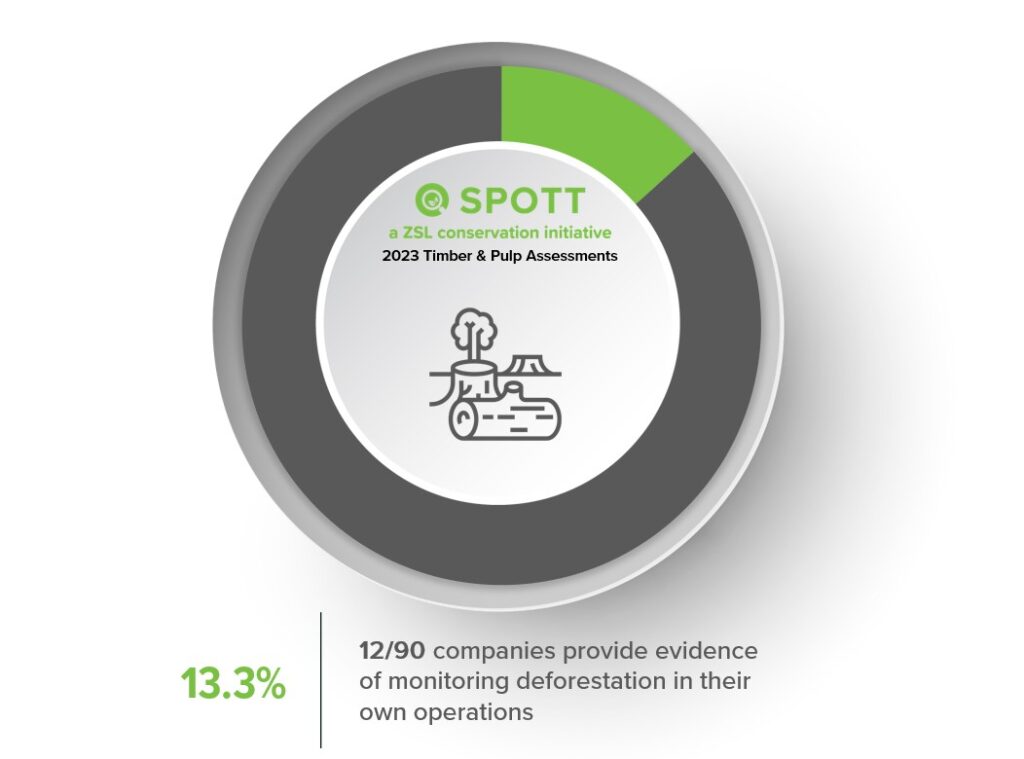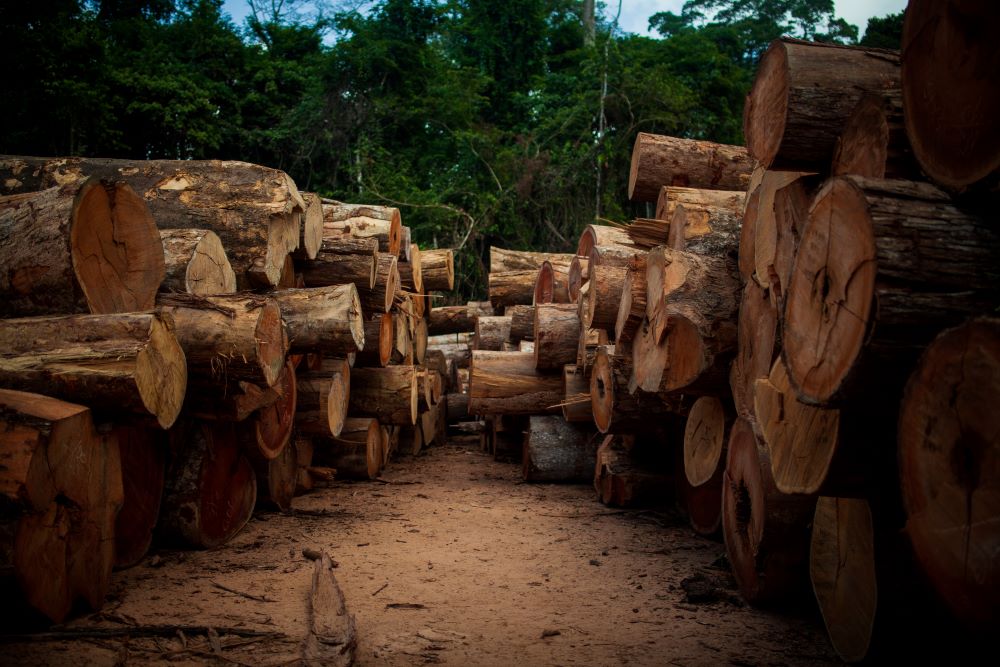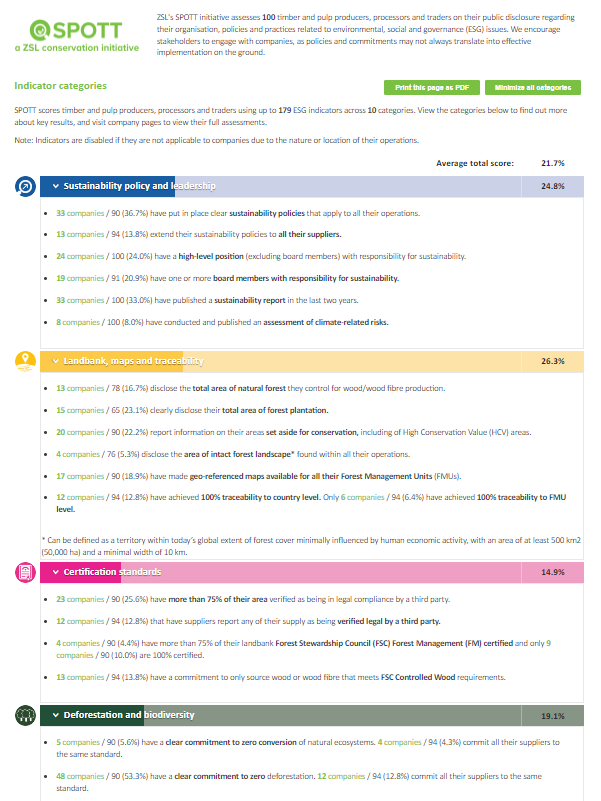Many of the world’s leading tropical timber and pulp companies are not prepared for incoming EU deforestation regulation, highlighting the need for urgent action from the industry.
Launched today (15 August 2023) new data from conservation charity ZSL’s SPOTT Timber and Pulp assessment reveals how many of the world’s major tropical timber and pulp companies are unprepared for the European Union Deforestation Regulation (EUDR) ahead of its implementation in December 2024 – with only 13.3% of companies publicly providing evidence of monitoring deforestation within their own operations, and only 4.3% monitoring their supplier’s operations.
The EUDR, applying to all companies that aim to place their products on the EU market, requires companies to ensure their products are verifiably deforestation-free, their origin is known, and they are produced legally in their country of origin. By doing so, the regulation aims to tackle biodiversity loss driven by deforestation and reduce greenhouse gas emissions.
With just 16 months left to implement the new rules, companies failing to comply with the EUDR risk losing access to the EU market – the world’s third-largest economy.
Sam Ross, ZSL’s Sustainable Business Project Analyst and lead analyst on the assessment, explained: “Accounting for one-sixth of global trade and over $4 billion worth of tropical timber and wood furniture imports (2022), the EU wields significant influence over global industries and commodity trade. The upcoming EUDR will set the tone for other emerging and existing legislation, such as the UK Environment Act and US FOREST Act – yet our findings highlight a worrying lack of readiness among many timber and pulp companies for the coming changes.
“This should act as a catalyst for transforming the industry. The EU is a major import market for timber, and we are hopeful that this wake-up call will stimulate proactive, meaningful change to meet the EUDR’s stipulations and protect tropical forests – the world’s most biodiverse landscapes.”

Under the EUDR, EU companies must ensure that any material they import has not caused deforestation after December 2020 or face criminal penalties. Only 15 of 90 SPOTT-assessed companies currently have a public commitment which meets this requirement. And even fewer – 8/94 (8.5%) – disclose that they require their suppliers to do the same.
Sam added: “This substantial gap between requirements and what companies are reporting underscores the urgent need for companies to not only establish monitoring systems but also to disclose the details of these systems publicly. These systems are critical for both tracking and mitigating environmental impacts throughout supply chains, ensuring products are verifiably deforestation and degradation-free.”
The EUDR also sets out a requirement for companies to obtain precise geolocation data for all the products they place on the EU market. SPOTT’s research indicates this will be a critical area of improvement for the sector, with just 6/94 (6.4%) companies publicly reporting they are currently able to trace 100% of their supply to the location of harvest. In addition, just 20/94 (21.3%) companies report the processes they use to engage suppliers on compliance with their policies and legal requirements.
Sam explained: “If the timber industry does not rapidly enact substantial change to become more sustainable, the lack of preparedness could have serious business implications, with companies facing non-compliance penalties of up to 4% of their EU turnover. The EU is a major market for many of the companies we assessed, so there is a clear financial incentive for them to take meaningful and immediate action to tackle deforestation.

Logs in a sawmill yard – Amazonia, Para, Brazil
“Buyers and investors across the world are increasingly expecting companies to ensure their products are sustainably produced – by making these changes the industry will not only be fulfilling EUDR requirements but will also be rising to meet these growing expectations.”
Robert-Alexandre Poujade, ESG analyst and biodiversity lead at BNP Paribas Asset Management, remarked: “As a major financial institution, we have an important role to play in promoting sustainable practices within the industries we invest in. The upcoming European Union Deforestation Regulation is a critical step in this journey. We are actively supporting our partners in the timber and pulp industries to enhance their compliance and meet these important regulations. The EUDR aligns with our own commitments, and we view it as an opportunity for the entire industry to progress towards a more sustainable future.”
ZSL urgently calls for buyers and financial institutions investing in tropical timber and pulp to support producer companies in addressing deforestation and enhancing their EUDR compliance. All supply chain stakeholders must aid in strengthening traceability, due diligence processes, and deforestation commitments to achieve the EUDR’s objectives to tackle the intertwined crises of climate change and biodiversity loss.
To access the freely available SPOTT Timber and Pulp assessment data, use the links below. To learn about ZSL’s sustainable business and finance services, visit www.zsl.org/sbf.
ZSL believes nature can recover, and that conservation is most effective when driven by science. We call for science to guide all global decisions on environment and biodiversity and build a healthier future for wildlife, people and the planet. Find out more and support ZSL’s world leading, collaborative science and conservation work at www.zsl.org.

